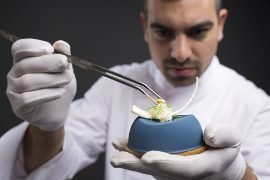
The young Lleida pastry chef, chosen last year’s best chocolate...

The thing is that a fruit juice is not fruit,...
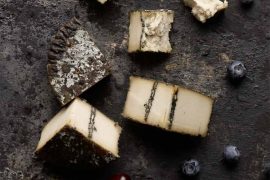
It is estimated that the vegetarian & vegan market will...

Speciality coffee is a different product from commercial coffee. Commercial...

At the beginning of the 14th century, Florentine merchant Francesco...
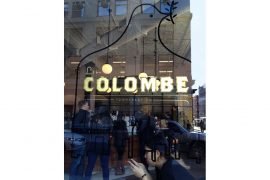
It’s 9:30 in the morning and in an imposing corner...
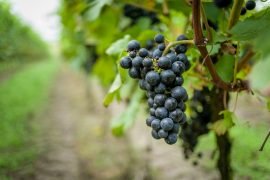
Thousands of years later, the fruit of the vine is...
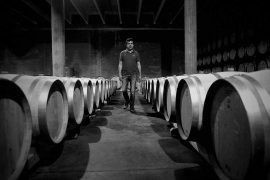
The 'Cérvoles Blanc 2016', has been chosen the best Catalan...
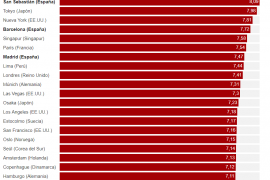
The city of San Sebastián tops a list of the favourite food...
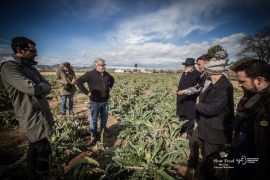
Good, clean, fair and local: these are the four key...

Música clásica sobre la arena de la playa en dos...

The first session of the cycle on the regatta organized...

The hospital's managing director, Manel del Castillo, and the pharmaceutical...

Generalitat y Ayuntamiento impulsarán dos equipamientos de 'Casa de les...

Leticia Beleta, director of Alexion Pharmaceuticals in Spain and Portugal,...

We all have a friend who never leaves the Gràcia...

Barcelona director opts for Best International Film with 'La sociedad...

The hotel and industrial sectors softened the market's decline last...

The technology company, with a workforce of 35 employees and...

“The women of yesteryear were strong and had to fight...
[dropcap letter=”I”]
‘ve always loved to feed others, all my life. This is the great mantra of Camila Loew, who lives in the United States where Sobremesa Culinary Tours was founded. This company gives guided culinary tours with Barcelona as one of its epicentres.
“The concept of sobremesa (the time spent at the table after a meal, enjoying the company) isn’t well-known in the United States. I understand it in connection to everything surrounding the act of eating, which is as important as what is on the plate. It is diametrically opposed to American fast-food culture. This is what I try to convey, the pleasure of calmly sitting down at the table without any hurry and enjoying each other’s company. No eating standing up, something you see often in the United States. In my classes, I always try to teach simple recipes so we can have more time after the meal to sit around and chat. Fortunately, the participants always understand the concept immediately.” And so, understanding eating as a social event and not just a physical need is the overarching concept behind everything this foodie, who defines herself as a perpetual foreigner, does.
Born in Argentina, she has lived in Buenos Aires, California and Barcelona, but it was in the Catalan capital where her perception of eating began to change. When she was pregnant the first time, “That was when the healthy eating and nutritional side of food became more important to me. I took loads of courses and workshops in Barcelona and New York (at the prestigious Natural Gourmet Institute). I did so many that there came a point when it was too much for me. I needed to start sharing everything I had learned. So I created Desayuno con Guisantes, a blog where I posted healthy recipes every week and at the weekends I started giving healthy cooking classes.”
And it all culminated in 2013 when, with 2 kids and 10 suitcases, she and her husband left Barcelona for Berkeley, California. “We wanted our kids to have the experience of growing up in different cultures, like I did. And, personally, that was when I decided to put my heart and soul into food.”
And Sobremesa was born, which for years shared her attentions with her job as a teacher, culinary director and, later, academic dean of Bauman College for Holistic Nutrition and Culinary Arts. “I created Sobremesa in early 2014: we started doing workshops, catering, community and private classes, and team-building events for businesses.”
In fact, it was her students who encouraged her to start Sobremesa Culinary Tours in 2017: “They were the ones behind it all, and the ones who pushed me to create the tours. I spent a year researching and designing the experiences and, last year, we started off with Barcelona and San Sebastian, and the two tours filled up. The experience was a success. In 2018, we’re doing these two cities again, and adding Japan.”
The tours are for groups of 8: “The intention is to create an intimate, personalised setting. I think this is the right number so you don’t have to use a megaphone or hold up a flag.” The first tours filled up just by word of mouth and, in fact, many of the participants were already Camila’s students. But people also signed up from other parts of the United States: “Traditional Spanish cuisine, for years now, has been very popular in the United States. I think they are drawn in by cuisine based on top-quality seasonal produce prepared simply.”
The culinary tour of Barcelona lasts 9 days. “The idea is to give participants a look at traditional culture, through cuisine, which is an essential part of any culture. Understanding a place through its culinary habits is a sensory experience, of course, but it also teaches about the local history, customs and people.”
It was very important to get away from the organised travel she detests and showcase the city where she lived for roughly 15 years. “Barcelona is much more than paella on the Ramblas, sangria and a Mexican hat. I’ve always been against that. We propose a quality alternative to mass tourism, something Barcelona still has to address. Participants get a different perspective on the city, the country and the culture, which would be hard for an accidental tourist.”
The tour agenda is quite well rounded: “It was a challenge to design these tours. The hardest part is striking a balance between offering a lot to do and keeping the calm, pleasurable feeling of the sobremesa.” Cooking classes with local chefs and Camila herself, guided tours of several of Barcelona’s markets, meals at restaurants in the city, etc. “We stay in Barcelona but we also do day-trips: to the eco-gardens of Maresme, to see the flora of Collserola, and a visit to a winery in Sant Sadurní. Another activity that participants liked best was a tasting of extra-virgin olive oils. The owner was surprised that everyone in the group bought at least one bottle, and some even bought several. She didn’t know that at one of the schools in California the students call me the olive-oil queen.”
And, of course, the tour had to include cultural activities and shopping. They go to Casa Batlló – Camila’s favourite building. And Camila also recommends her favourite shops: “I always suggest small shops in neighbourhoods around Barcelona. Quality local craftspeople.” The tour participants only had one night off to do whatever they wanted: “I gave them an optional activity, a traditional Catalan dinner at the home of a friend of mine who is a cook. To my surprise, nearly all of them signed up and they loved it!”
After the resounding success of the first round, another set of American culinary tourists will be coming to Barcelona in late October 2018 to taste all of the city’s nooks and crannies.
[dropcap letter=”I”]
‘ve always loved to feed others, all my life. This is the great mantra of Camila Loew, who lives in the United States where Sobremesa Culinary Tours was founded. This company gives guided culinary tours with Barcelona as one of its epicentres.
“The concept of sobremesa (the time spent at the table after a meal, enjoying the company) isn’t well-known in the United States. I understand it in connection to everything surrounding the act of eating, which is as important as what is on the plate. It is diametrically opposed to American fast-food culture. This is what I try to convey, the pleasure of calmly sitting down at the table without any hurry and enjoying each other’s company. No eating standing up, something you see often in the United States. In my classes, I always try to teach simple recipes so we can have more time after the meal to sit around and chat. Fortunately, the participants always understand the concept immediately.” And so, understanding eating as a social event and not just a physical need is the overarching concept behind everything this foodie, who defines herself as a perpetual foreigner, does.
Born in Argentina, she has lived in Buenos Aires, California and Barcelona, but it was in the Catalan capital where her perception of eating began to change. When she was pregnant the first time, “That was when the healthy eating and nutritional side of food became more important to me. I took loads of courses and workshops in Barcelona and New York (at the prestigious Natural Gourmet Institute). I did so many that there came a point when it was too much for me. I needed to start sharing everything I had learned. So I created Desayuno con Guisantes, a blog where I posted healthy recipes every week and at the weekends I started giving healthy cooking classes.”
And it all culminated in 2013 when, with 2 kids and 10 suitcases, she and her husband left Barcelona for Berkeley, California. “We wanted our kids to have the experience of growing up in different cultures, like I did. And, personally, that was when I decided to put my heart and soul into food.”
And Sobremesa was born, which for years shared her attentions with her job as a teacher, culinary director and, later, academic dean of Bauman College for Holistic Nutrition and Culinary Arts. “I created Sobremesa in early 2014: we started doing workshops, catering, community and private classes, and team-building events for businesses.”
In fact, it was her students who encouraged her to start Sobremesa Culinary Tours in 2017: “They were the ones behind it all, and the ones who pushed me to create the tours. I spent a year researching and designing the experiences and, last year, we started off with Barcelona and San Sebastian, and the two tours filled up. The experience was a success. In 2018, we’re doing these two cities again, and adding Japan.”
The tours are for groups of 8: “The intention is to create an intimate, personalised setting. I think this is the right number so you don’t have to use a megaphone or hold up a flag.” The first tours filled up just by word of mouth and, in fact, many of the participants were already Camila’s students. But people also signed up from other parts of the United States: “Traditional Spanish cuisine, for years now, has been very popular in the United States. I think they are drawn in by cuisine based on top-quality seasonal produce prepared simply.”
The culinary tour of Barcelona lasts 9 days. “The idea is to give participants a look at traditional culture, through cuisine, which is an essential part of any culture. Understanding a place through its culinary habits is a sensory experience, of course, but it also teaches about the local history, customs and people.”
It was very important to get away from the organised travel she detests and showcase the city where she lived for roughly 15 years. “Barcelona is much more than paella on the Ramblas, sangria and a Mexican hat. I’ve always been against that. We propose a quality alternative to mass tourism, something Barcelona still has to address. Participants get a different perspective on the city, the country and the culture, which would be hard for an accidental tourist.”
The tour agenda is quite well rounded: “It was a challenge to design these tours. The hardest part is striking a balance between offering a lot to do and keeping the calm, pleasurable feeling of the sobremesa.” Cooking classes with local chefs and Camila herself, guided tours of several of Barcelona’s markets, meals at restaurants in the city, etc. “We stay in Barcelona but we also do day-trips: to the eco-gardens of Maresme, to see the flora of Collserola, and a visit to a winery in Sant Sadurní. Another activity that participants liked best was a tasting of extra-virgin olive oils. The owner was surprised that everyone in the group bought at least one bottle, and some even bought several. She didn’t know that at one of the schools in California the students call me the olive-oil queen.”
And, of course, the tour had to include cultural activities and shopping. They go to Casa Batlló – Camila’s favourite building. And Camila also recommends her favourite shops: “I always suggest small shops in neighbourhoods around Barcelona. Quality local craftspeople.” The tour participants only had one night off to do whatever they wanted: “I gave them an optional activity, a traditional Catalan dinner at the home of a friend of mine who is a cook. To my surprise, nearly all of them signed up and they loved it!”
After the resounding success of the first round, another set of American culinary tourists will be coming to Barcelona in late October 2018 to taste all of the city’s nooks and crannies.
